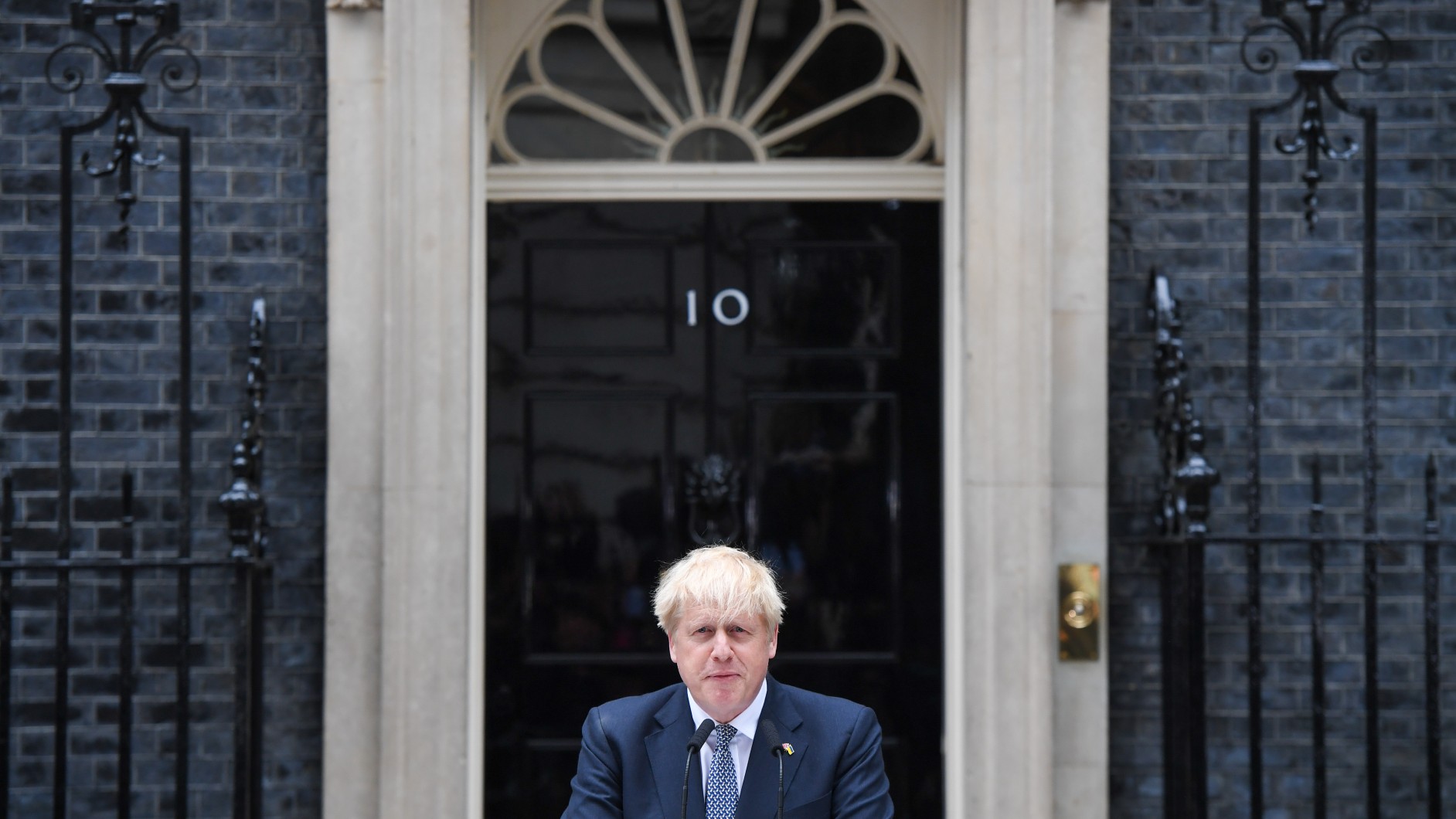Why Boris Johnson clung on so long – and what finally made him resign
Did PM’s ‘bunker mentality’ and competitive nature stop him from stepping down?

A free daily email with the biggest news stories of the day – and the best features from TheWeek.com
You are now subscribed
Your newsletter sign-up was successful
Boris Johnson has been described as Britain’s “Teflon leader” for his unmatched ability to withstand crises but even he has proved unable to withstand the recent avalanche of Tory scandals.
The prime minister finally announced his resignation as Tory leader this afternoon, weeks after surviving a confidence vote in the wake of the Partygate scandal. Right up until the last minute, Johnson was refusing to step down, despite facing more ministerial resignations than any PM in history.
The Times reported earlier today that Johnson had told ministers pushing for his resignation that he was “absolutely determined” and “100% ready” to fight a second confidence vote.
The Week
Escape your echo chamber. Get the facts behind the news, plus analysis from multiple perspectives.

Sign up for The Week's Free Newsletters
From our morning news briefing to a weekly Good News Newsletter, get the best of The Week delivered directly to your inbox.
From our morning news briefing to a weekly Good News Newsletter, get the best of The Week delivered directly to your inbox.
Bunker mentality
The “sheer bloody-mindedness” displayed by the PM in recent days is further evidence of the “bunker mentality” that has prevailed throughout his premiership, said Politico’s London Playbook.
The Spectator’s political editor James Forsyth has argued that Johnson has overseen a “new, super-defensive mode of government where survival is seen as victory”.
The PM demonstrated his determination to survive calls for his resignation, from both outside and within his party, during a “marathon, nine-day overseas” trip last month, said The Guardian’s political correspondent Peter Walker. Throughout his various public appearances, Johnson repeatedly rebuffed “serious questions about his authority and if voters trusted him”, insisting that his “golden rule” was that “politicians should not talk about themselves, just their policies”.
Downing Street insiders have also accused their boss of having a “bunker mentality”, a mindset said to have helped create the culture exposed by the Partygate revelations. An unnamed No. 10 adviser told The Times earlier this year that “there was a sense that we had lashed ourselves to the mast while the rest of the civil service had gone home”.
A free daily email with the biggest news stories of the day – and the best features from TheWeek.com
But in recent days, Johnson’s “bunker mentality” has gone from “bad” to “1944 bunker bad”, a former aide to the PM told London Playbook, in a reference to Adolf Hitler’s retreat underground in the final months of the Second World War. And a “normally reserved MP described the prime minister as appearing ‘detached from reality’”, according to the site.
Non-conformist streak
Another likely factor behind Johnson’s determination to cling to power is his non-conformist streak – a trait that undoubtedly contributed to his winning a sizeable majority in the 2019 general election. “Part of Johnson’s political appeal has always been a public perception that he is not a normal politician who operates by the expected standards,” wrote Politico’s Tim Ross and Eleni Courea following the confidence vote last month.
Throughout his premiership, Johnson “has always ignored the course of action that conventional wisdom says he ‘should’ do, inviting his critics to try to stop him”, said London Playbook.
The Spectator’s deputy political editor Katy Balls agreed, writing before his resignation announcement that Johnson “believes he can be vulnerable if he follows convention – something he has always tried to avoid doing”. An unnamed minister told Balls that the PM was “not a conventional politician, so will not respond to conventional notions of decency”.
“It’s not about what’s good for the party or the country – it’s just about him,” added the insider.
Ultra-competitive nature
The PM’s competitive nature is a further factor in his determination to hold on to the top job, according to commentators. “Johnson is so ultra-competitive that he will never accept he’s losing, even when it’s painfully obvious to others that his side is headed for defeat,” said Politico’s Ross and Courea.
Biographer Andrew Gimson, author of Boris: The Making of the Prime Minister, said Johnson’s “stubborn refusal to accept defeat” can be dated back to his childhood playing sports both at Eton and at home with his siblings. “He always thinks he can win. He will fight until his dying breath,” Gimson told Politico.
Political commentator Tom Newton Dunn has argued that “the truth is that nobody thrives more on competition than Johnson”.
“He’s the most competitive person any of us have ever met,” Newton Dunn added in an article last year for the London Evening Standard.
‘Avalanche’ of resignations
Pundits are suggesting that the key factor behind Johnson’s decision to finally call it quits as PM was the recent “avalanche” of junior ministerial resignations, which left his government struggling to function.
While Johnson had replaced most of the cabinet members who quit in protest against his leadership, “the resignation of a host of junior ministers” – who “do much of the important work of governing” – had “made his government inviable”, said Stephen Bush today in the Financial Times.
Right now, we essentially have a “non government”, Bush added. “It cannot fulfil its basic functions, and unless we are seriously proposing that its remaining members start holding down three or four different ministerial jobs, it has no serious prospect of being able to.”
And the further challenges of trying to regain public confidence after the Chris Pincher affair, plus two recent by-election defeats, appear to have worn away the last of the PM’s Teflon sheen.
Kate Samuelson is The Week's former newsletter editor. She was also a regular guest on award-winning podcast The Week Unwrapped. Kate's career as a journalist began on the MailOnline graduate training scheme, which involved stints as a reporter at the South West News Service's office in Cambridge and the Liverpool Echo. She moved from MailOnline to Time magazine's satellite office in London, where she covered current affairs and culture for both the print mag and website. Before joining The Week, Kate worked at ActionAid UK, where she led the planning and delivery of all content gathering trips, from Bangladesh to Brazil. She is passionate about women's rights and using her skills as a journalist to highlight underrepresented communities. Alongside her staff roles, Kate has written for various magazines and newspapers including Stylist, Metro.co.uk, The Guardian and the i news site. She is also the founder and editor of Cheapskate London, an award-winning weekly newsletter that curates the best free events with the aim of making the capital more accessible.
-
 Why is the Trump administration talking about ‘Western civilization’?
Why is the Trump administration talking about ‘Western civilization’?Talking Points Rubio says Europe, US bonded by religion and ancestry
-
 Quentin Deranque: a student’s death energizes the French far right
Quentin Deranque: a student’s death energizes the French far rightIN THE SPOTLIGHT Reactions to the violent killing of an ultraconservative activist offer a glimpse at the culture wars roiling France ahead of next year’s elections
-
 Secured vs. unsecured loans: how do they differ and which is better?
Secured vs. unsecured loans: how do they differ and which is better?the explainer They are distinguished by the level of risk and the inclusion of collateral
-
 How corrupt is the UK?
How corrupt is the UK?The Explainer Decline in standards ‘risks becoming a defining feature of our political culture’ as Britain falls to lowest ever score on global index
-
 The high street: Britain’s next political battleground?
The high street: Britain’s next political battleground?In the Spotlight Mass closure of shops and influx of organised crime are fuelling voter anger, and offer an opening for Reform UK
-
 The MAGA civil war takes center stage at the Turning Point USA conference
The MAGA civil war takes center stage at the Turning Point USA conferenceIN THE SPOTLIGHT ‘Americafest 2025’ was a who’s who of right-wing heavyweights eager to settle scores and lay claim to the future of MAGA
-
 Is a Reform-Tory pact becoming more likely?
Is a Reform-Tory pact becoming more likely?Today’s Big Question Nigel Farage’s party is ahead in the polls but still falls well short of a Commons majority, while Conservatives are still losing MPs to Reform
-
 What does the fall in net migration mean for the UK?
What does the fall in net migration mean for the UK?Today’s Big Question With Labour and the Tories trying to ‘claim credit’ for lower figures, the ‘underlying picture is far less clear-cut’
-
 Asylum hotels: everything you need to know
Asylum hotels: everything you need to knowThe Explainer Using hotels to house asylum seekers has proved extremely unpopular. Why, and what can the government do about it?
-
 Five takeaways from Plaid Cymru’s historic Caerphilly by-election win
Five takeaways from Plaid Cymru’s historic Caerphilly by-election winThe Explainer The ‘big beasts’ were ‘humbled’ but there was disappointment for second-placed Reform too
-
 The new age of book banning
The new age of book banningThe Explainer How America’s culture wars collided with parents and legislators who want to keep their kids away from ‘dangerous’ ideas